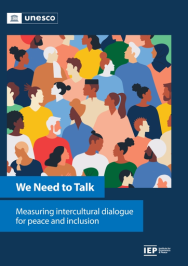
Article
Launch of the new UNESCO Framework for Enabling Intercultural Dialogue
At a time of increased tensions, racism, and xenophobia, the need for intercultural dialogue as a tool for creating transformative communication capable of building understanding, trust, and cooperation is greater than ever.

With data from 160 Member States, the Framework provides policymakers and practitioners with the key evidence needed to increase the impact of dialogue as a tool for peace, conflict prevention and human rights. It provides detailed insights on both the enabling environment for intercultural dialogue to thrive – covering domains such as inclusion and representation, freedom of expression, and social cohesion – and outcomes related to peace and inclusion. For the 1.5 billion people found to be living in countries where support for dialogue is low and the risk of forced displacement, extreme poverty, discrimination, and violence is higher, this data has the potential to make a big difference.
Ms Ramos was joined at the launch by numerous expert speakers including Dr Muhammad Al-Maamari, Minister of Endowments and Religious Affairs of Oman, and Ms Olivia Grange, Minister of Culture, Gender, Entertainment and Sport of Jamaica.
She emphasized the power of intercultural dialogue as a tool for all stating,
Looking forward, three country pilots will be undertaken to engage government and civil society stakeholders with the country-level data, preparing the ground for the development of national action plans to launch concrete actions to enhance the opportunities for dialogue, leveraging the tools and expertise of UNESCO and its partners. The implementation of the Framework will make an important contribution to advancing UNESCO’s new Roadmap Against Racism and Discrimination, and will be discussed at the forthcoming Global Forum Against Racism and Discrimination to take place in Mexico City from 28 to 29 November 2022.











